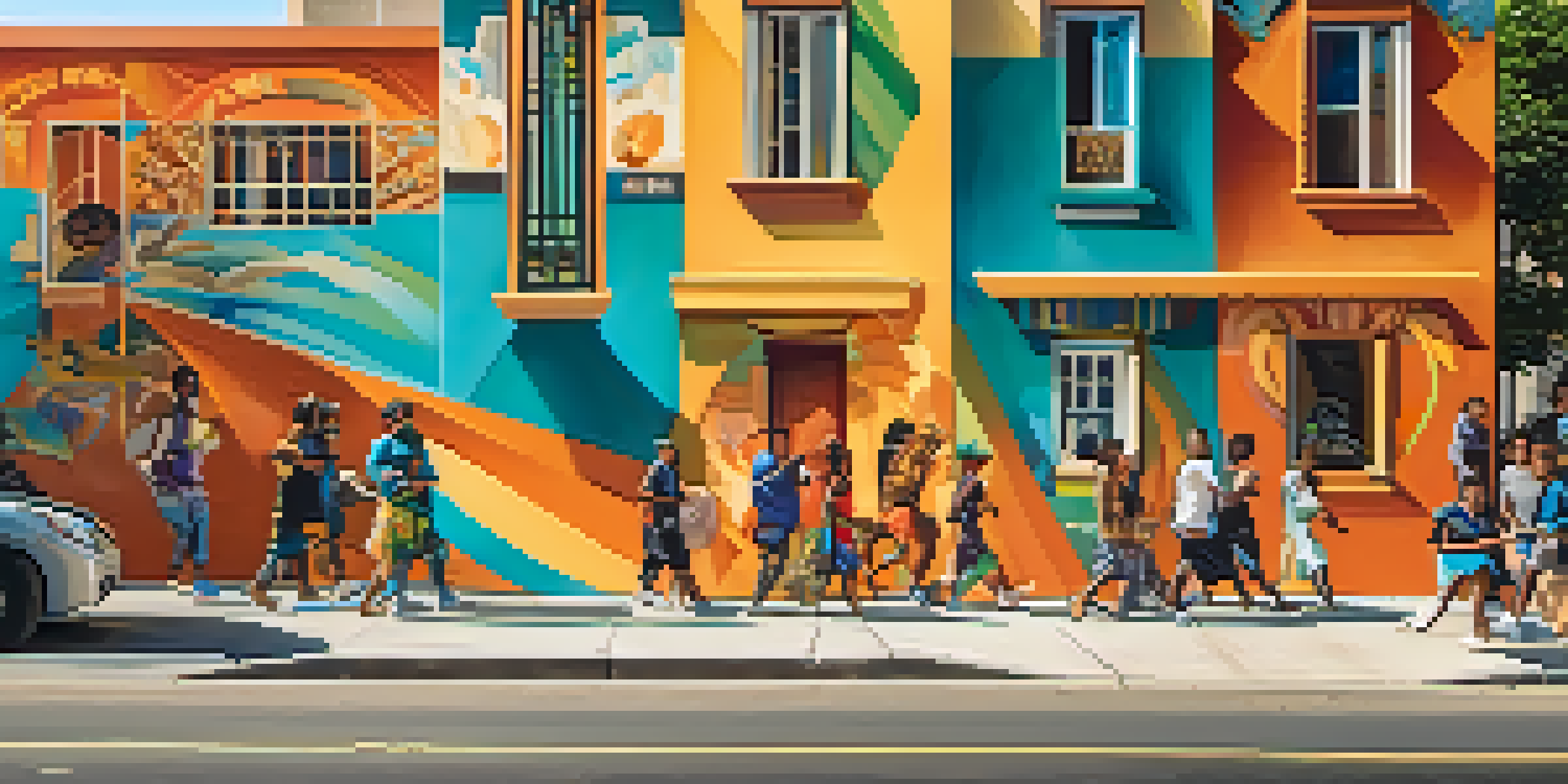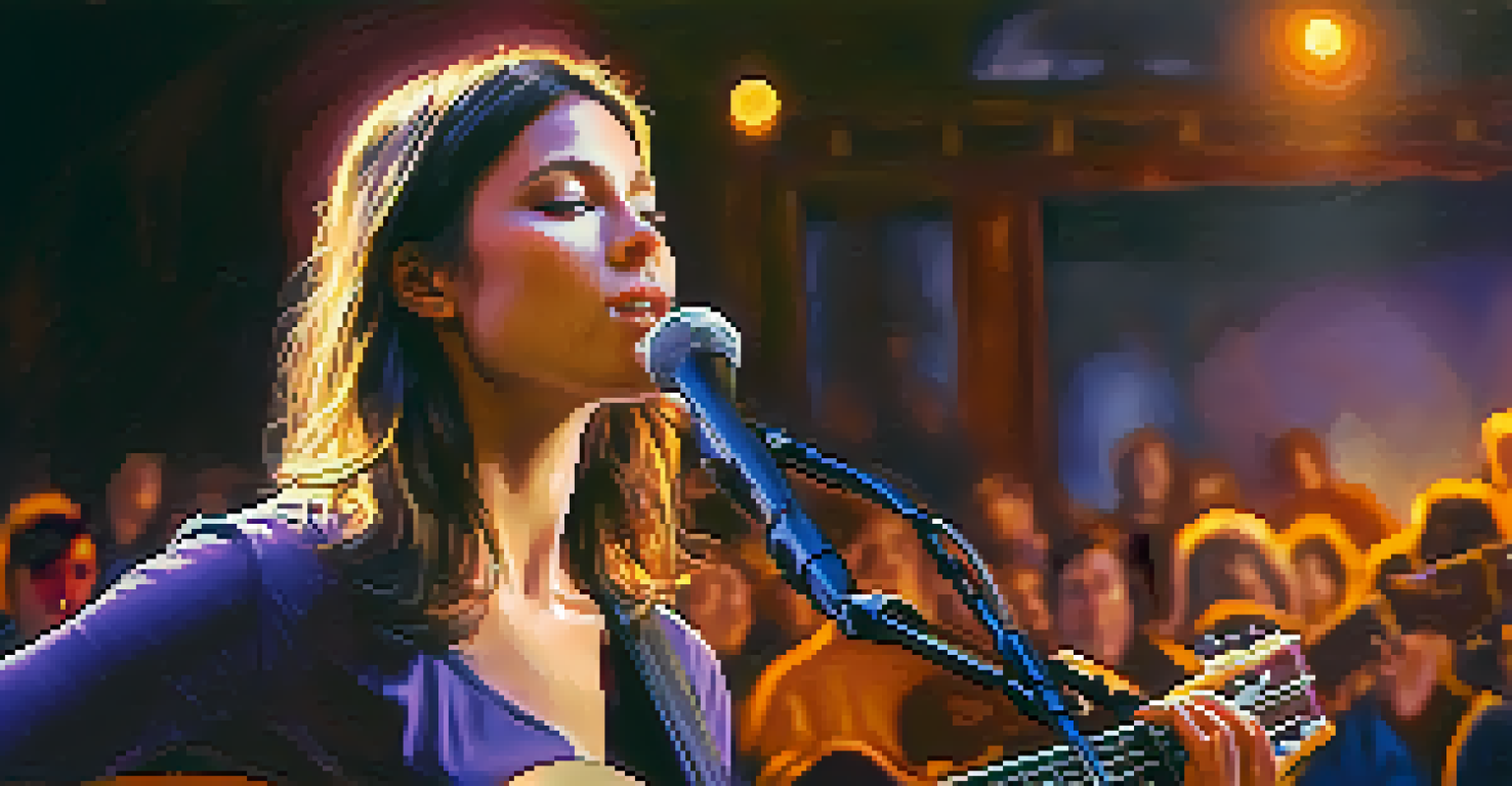The Role of Artists in Upholding Ethical Standards

Artists as Cultural Commentators and Advocates
Artists often serve as the voice of society, reflecting cultural values and social issues through their work. Whether it's through painting, music, or literature, they highlight injustices and provoke thought among audiences. This commentary can challenge the status quo, encouraging viewers to reconsider their perspectives and take action.
Art is not a mirror to hold up to society, but a hammer with which to shape it.
For instance, the works of artists like Ai Weiwei bring attention to human rights violations, inspiring global movements for change. By addressing these topics, artists not only engage their audience but also promote ethical standards by raising awareness about crucial issues. Their influence can spark conversations that lead to tangible social reform.
Through their creative expressions, artists remind us of our shared humanity and the ethical responsibilities we hold towards one another. This role as cultural commentators is vital in shaping a more compassionate society, urging individuals and communities to reflect on their values and actions.
Challenging Norms: The Power of Artistic Expression
Art has a unique ability to challenge societal norms and question ethical boundaries. When artists push these limits, they often provoke necessary discussions about what is considered acceptable or taboo. This kind of artistic expression can lead to breakthroughs in understanding complex moral dilemmas.

Consider the provocative works of Banksy, who uses street art to confront issues like consumerism and war. His art not only entertains but also sparks debate, prompting viewers to think critically about the ethics behind these societal concerns. In this way, artists become catalysts for change, urging society to evolve.
Artists as Voices of Change
Through their work, artists reflect societal issues and inspire discussions that can lead to social reform.
By pushing the envelope, artists can inspire audiences to reconsider their own beliefs and actions. This challenge to the norm is essential in fostering ethical growth within individuals and communities, paving the way for a more just and equitable world.
Artists as Role Models in Ethical Leadership
Many artists take on the role of ethical leaders, using their platforms to promote values such as integrity, compassion, and justice. Their visibility allows them to influence not just their fans, but also the larger society. By standing up for ethical causes, they set an example for others to follow.
The role of the artist is to make the revolution irresistible.
For example, musicians like Billie Eilish advocate for mental health awareness and environmental sustainability. By openly discussing these issues, they destigmatize important conversations and encourage their audience to engage with ethical concerns. Such leadership can inspire change and motivate individuals to act responsibly.
In this way, artists not only create but also lead, guiding their followers toward a more ethical way of living. Their commitment to integrity and social justice reinforces the idea that art can be a powerful tool for positive change.
The Impact of Art on Public Perception of Ethics
Art has the capacity to shape public perception, influencing how we view ethical issues in society. Through storytelling and emotional engagement, artists can make complex topics more relatable and accessible. This emotional connection can foster empathy and understanding among diverse audiences.
For instance, films that depict social justice movements can help viewers grasp the emotional weight of these struggles, leading to greater awareness and advocacy. By presenting ethical dilemmas through art, creators can encourage audiences to reflect on their values and the impact of their choices.
Art Challenges Ethical Norms
Creative expressions often provoke necessary conversations about societal norms and ethical boundaries.
Ultimately, art acts as a bridge between personal and societal ethics, prompting discussions that can lead to meaningful change. By framing ethical issues in a compelling way, artists play a crucial role in shaping public discourse.
The Ethical Responsibilities of Artists
With great power comes great responsibility, and artists are no exception. Their work has the potential to influence public opinion and social norms, which means they must consider the ethical implications of their creations. This responsibility can be daunting, but it also presents an opportunity to promote positive messages.
Artists are often in a position to expose societal flaws and advocate for justice. However, they must be mindful of how their work can affect marginalized communities and strive to represent diverse voices authentically. This careful consideration ensures that art serves as a force for good rather than perpetuating harmful stereotypes.
By embracing their ethical responsibilities, artists can create works that uplift and empower others. This commitment to ethical creation not only enriches their own practice but also contributes to a more just and equitable society.
Art as a Tool for Social Change
Throughout history, art has been a powerful tool for social change, inspiring movements and fostering dialogue. From protest songs to politically charged visual art, creators have utilized their talents to advocate for justice and equality. This capacity for social impact underscores the importance of art in promoting ethical values.
For example, the song 'Fight the Power' by Public Enemy became an anthem for civil rights, galvanizing listeners to stand up against oppression. Such works can mobilize communities and inspire collective action, demonstrating how art can effect meaningful change in society.
Artists' Role in Ethical Leadership
By advocating for crucial issues, artists set an example of integrity and social responsibility for their audiences.
In essence, when artists harness their creativity for social advocacy, they contribute significantly to the ethical landscape of their communities. This transformative power of art reminds us that creativity is not just an expression, but also a call to action.
The Future of Ethical Standards in Art
As society evolves, so too must the ethical standards within the art world. Emerging technologies and new mediums present both challenges and opportunities for artists. Navigating these changes requires an ongoing commitment to ethical practices and a willingness to adapt.
For instance, the rise of digital art and NFTs (non-fungible tokens) has raised questions about ownership, copyright, and environmental impact. Artists must engage with these issues critically to ensure their work aligns with their ethical values. This adaptability is crucial in maintaining the integrity of artistic expression in a rapidly changing landscape.

Looking ahead, artists have the potential to lead the way in establishing new ethical standards that promote inclusivity and sustainability. By remaining vigilant and proactive, they can help shape a future where art continues to uplift and inspire positive change.
Conclusion: The Lasting Impact of Artists on Ethics
In conclusion, artists play a vital role in upholding ethical standards across various facets of society. Through their creativity, they challenge norms, inspire change, and foster empathy among audiences. Their influence can spark important conversations and motivate individuals to reflect on their own ethical responsibilities.
As cultural commentators and ethical leaders, artists have the power to guide society toward a more compassionate future. By embracing their roles and responsibilities, they can create work that not only entertains but also uplifts and empowers.
Ultimately, the lasting impact of artists on ethics is a testament to the profound connection between creativity and social responsibility. As we continue to navigate complex ethical landscapes, the contributions of artists will remain essential in shaping a more just and equitable world.